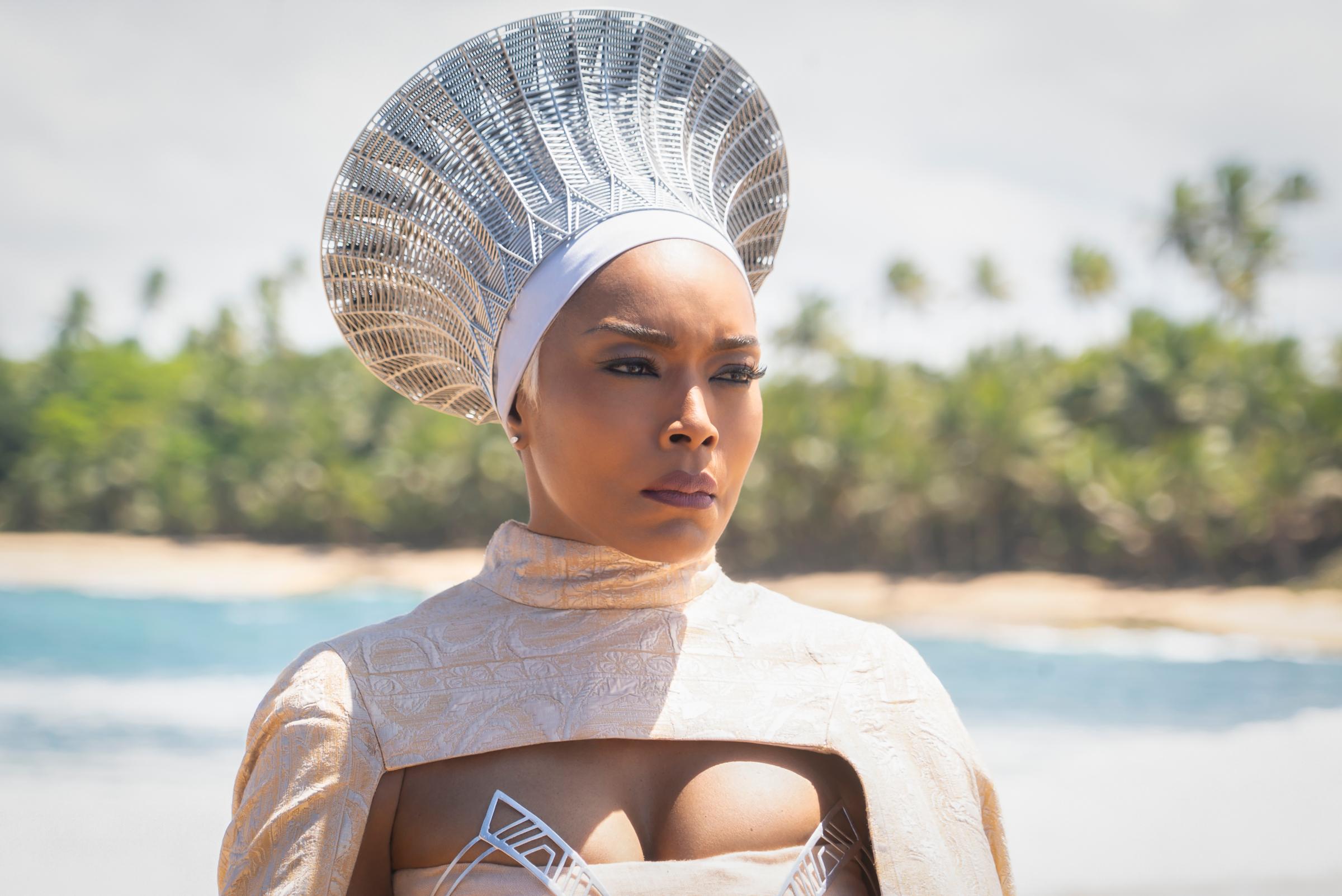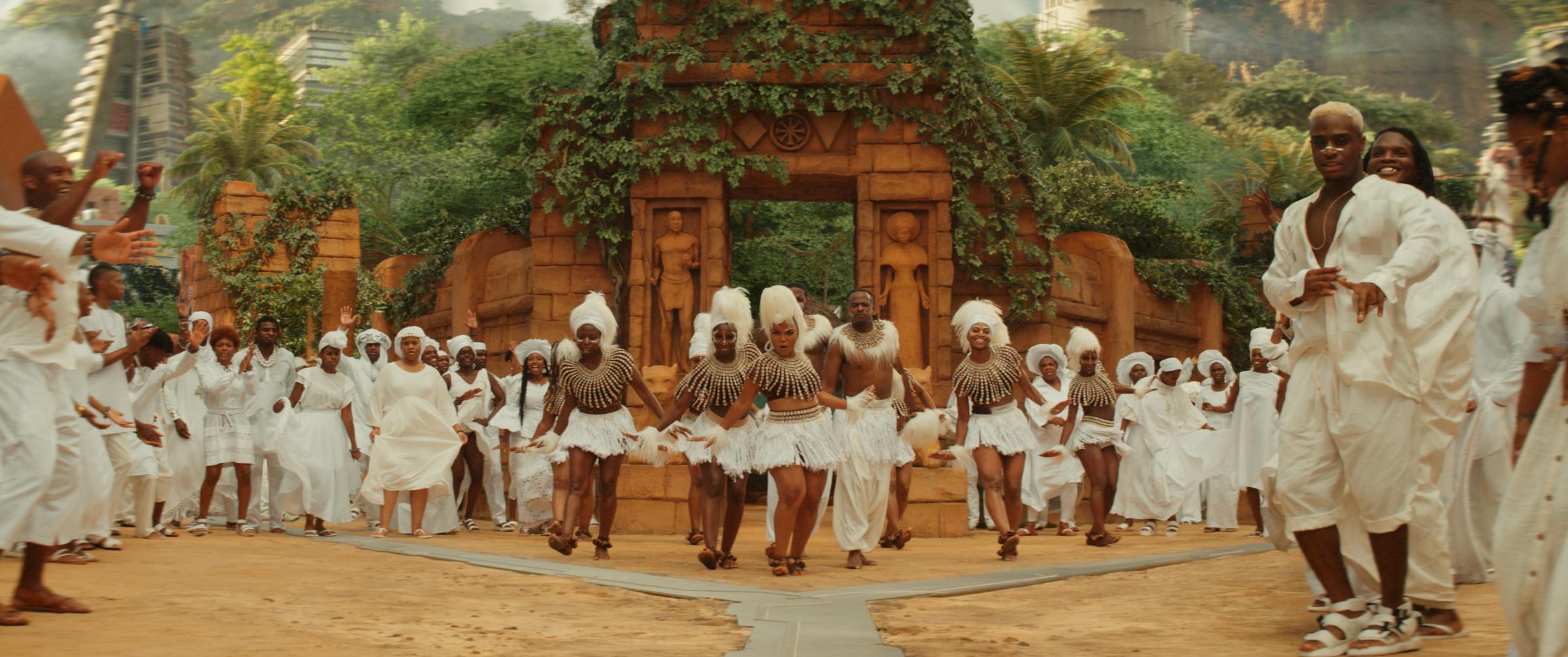Black Panther: Wakanda Forever, Ryan Coogler’s follow-up to the resplendent 2018 Marvel adventure Black Panther, offers spectacle to spare. The production design, once again by Hannah Beachler, balances elaborate manmade glamour with the glory of the natural world, as represented by the landscape of the African fantasy kingdom of Wakanda. When Angela Bassett’s imperious Queen Ramonda holds court, she does so from a throne shaped like the stylized horns of a stag beetle—it’s both elegant and menacing, more Philippe Starck than Tony Stark. And Ruth Carter’s costumes are possibly even more glorious than those she created for the first film: Ramonda, in particular, gets a bevy of fantastic looks, including a royal gown of deep red traced with intricate brown embroidery, not to mention an assortment of out-of-this-world flying-saucer crowns. Wakanda Forever is grand, all right. Yet there’s not much Coogler, or anyone, can do about the gaping hole at its center: With no Chadwick Boseman, it’s missing a measure of magic, a sad reality that’s no one’s fault.
The film, now streaming on Disney+, opens with an ending: Wakandan princess and genius scientist Shuri (Letitia Wright, appealing as always) scrambles to find a way to save her dying brother, T’Challa, the king of Wakanda as well as the mystical superhero Black Panther. She can’t pull it off: Ramonda appears, her grief vibrating beneath her stoic bearing, to tell her that her brother has died. The funeral is a half-somber, half-celebratory affair, a mix of melancholy remembrance and life-affirming rituals, complete with dancers in fringed skirts and feathery headdresses. T’Challa’s coffin, carried by its team of all-woman warrior pallbearers—including Danai Gurira’s Okoye, showing nothing but betraying every mote of sorrow even so—is eventually relinquished to the sky, where it’s subsumed into a triangular ceremonial object and whisked off, gone forever. In this opening scene, T’Challa is barely a whisper, though his absence hangs over the rest of the film as a kind of meta-presence.

Brushing aside her grief for duty, Queen Ramonda takes the throne as Wakanda’s ruler. Getting back to work, she attends a United Nation summit in which she dresses down a snippy French ambassador who’s trying to get her hands on Wakanda’s most precious resource, Vibranium, for her country’s own use. (This moment is a delight; Bassett throws shade like nobody’s business.) Everyone in the world wants Vibranium, and Wakanda is the only place that’s got it—or so the citizens of Wakanda believe.
Meanwhile, Shuri is so distraught over the loss of her brother that she can barely function anywhere outside her laboratory. Her mother tries to counsel her but can’t break through; their relationship has a believably prickly emotional texture. Soon, though, these two have problems beyond themselves, in the form of an underwater nation of blue people who threaten Wakanda’s equilibrium. This civilization, known as Talokan and springing from ancient Mayan roots, is a little like Atlantis crossed with Studio 54—it hardly seems like a threatening place. But its ruler, Namor (Tenoch Huerta), a god-man with pointed ears and wings sprouting from his ankles, isn’t particularly easy to read. He shows up in Wakanda, unannounced and aggressive, half-seeking, half-demanding that country’s aid in mounting a defense against the outside world, which has gotten a little too close to Talokan’s closely guarded secrets.
Read More: The Revolutionary Power Of Black Panther
The story that follows takes a million twists, seemingly operating on the logic that modern audiences want more twists for their dollar. (The script is by Coogler and Joe Robert Cole; the movie clocks in at roughly two hours and 40 minutes.) It hasn’t occurred to anyone at the MCU helm that the truly revolutionary thing would be to make a movie with fewer and better twists, one that focuses more on the relationships between characters than on tossing in one—or two, or three—extra battle scenes. What if these movies were scaled down a bit, trimmed into something lean and potent rather than just long? Wakanda Forever is set in a world that many people desperately want to revisit—in the first film, Wakanda and its citizens were so vivid it’s no wonder they took a hold on us. But Wakanda Forever feels a lot like Marvel business as usual, marred by the usual muddily rendered action sequences and ungainly plot mechanics.

It also has lots of extra pockets, sewn on to make room for all the characters audiences expect to see, as well as some new ones. Lupita Nyong’o returns as Nakia, essentially T’Challa’s widow, but doesn’t get a whole lot to do. Martin Freeman again plays CIA guy Ross; his story feels wedged in. Dominique Thorne plays teenage supergenius Riri Williams—she and Shuri forge a bond that’s intriguing but barely explored. The movie’s most compelling dynamic is the electricity between mother-and-daughter Ramonda and Shuri, but that, too, is frustratingly muted, despite Wright’s agile charm and Bassett’s beneath-the-surface warmth.
When the Black Panther returns, late in the story, the picture briefly springs to life. (Again, Carter has outdone herself with the costume, a matte-black suit streaked and dotted with metallic gold and silver, a kind of 1930s art deco vision filtered through a 1980s Tron sensibility.) Wakanda Forever is clearly designed to be “about” grief. But that doesn’t mean it deals with grief in a particularly deep or significant way. This must have been an incredibly difficult film to make, for the obvious reasons: how does a filmmaker and his cast carry on after the loss of such a dazzling colleague? But ticking boxes isn’t the same as pulling magic—or even just insight—from thin air. The picture’s most stirring moments come near the end, where we get brief flashback glimpses of Boseman as T’Challa. For those few seconds, he radiates everything that’s missing from Wakanda Forever. The sad reality is that the show must go on, and without him, it’s just more of the same. Our job is to pretend it’s enough.
More Must-Reads from TIME
- Cybersecurity Experts Are Sounding the Alarm on DOGE
- Meet the 2025 Women of the Year
- The Harsh Truth About Disability Inclusion
- Why Do More Young Adults Have Cancer?
- Colman Domingo Leads With Radical Love
- How to Get Better at Doing Things Alone
- Michelle Zauner Stares Down the Darkness
Contact us at letters@time.com